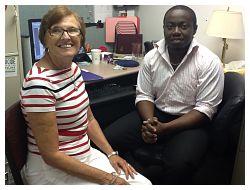
Albert Boateng ’14 and Diane Ryan at Community Action Partnership in Madison County
As an international student from Ghana, spending the summer learning about and contributing to “the region that plays host to my second home” is both meaningful and rewarding to Albert Boateng ’14. Albert is working with Community Action Partnership (CAP) primarily on a needs assessment of Madison County. This assessment will lay the foundation for a larger project that CAP intends to pursue. He is also working with the staff on overall development efforts, such as appeals and grant applications. Thus far, Albert has not only observed the complexities of poverty in Madison County, but also gained a richer understanding of social work in the United States (U.S.).
CAP was established in 1983 as an anti-poverty organization. It is one of over a thousand community action agencies across the U.S. and one of fifty-two in New York State. CAP provides an array of services that assist Madison County residents in attaining economic self-sufficiency. These include youth mentoring, transitional apartments, budgeting assistance, emergency needs assistance, food pantries, a first time homebuyers program, nutritional outreach and education, and free health services at the Mary Rose Center in Oneida. Albert describes CAP as an organization that “brings hope and stability into the homes of low-income families in this county.” Coupled with the “second family” that comprises the staff of CAP, Albert feels supported and inspired to complete the needs assessment.
Albert interacts with a variety of stakeholders both within and beyond CAP on a daily basis. These conversations informed the creation of the needs assessment and continue to shape his understanding of the poverty in Madison County that seemed nonexistent to him before. Albert is interviewing clients who access CAP’s services regularly because be believes “the residents will have a much better idea of the kind of services that would improve the overall quality of life in the county.” He hopes to gather 30-50 responses by the end of his fellowship. The CAP staff will continue to collect up to 100 following Albert’s departure. The report he compiles will not only reveal information about clients’ satisfaction with present services offered, but will also provide important demographic data that CAP can utilize in future fundraising efforts.
Albert, who is an economics and environmental studies major worked at a nonprofit as part of a course this past spring semester and believes he will work with a nonprofit at some point during his career. Albert’s work with CAP is allowing him to “learn the day-to-day functioning and operations of an agency of this nature,” as well as ascertain differences between social work in Ghana and the U.S. He could not pass up the opportunity to apply his skills and pursue his “life-long passion” of affecting others’ lives through the Upstate Institute and feels thankful to be a fellow this summer.

